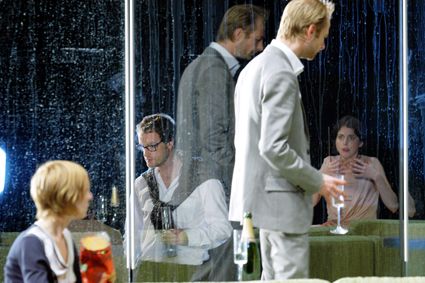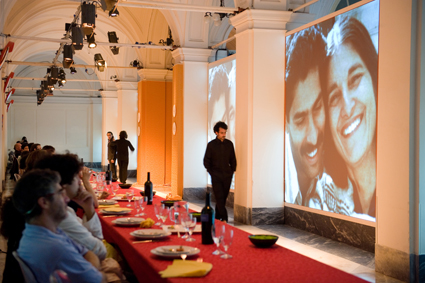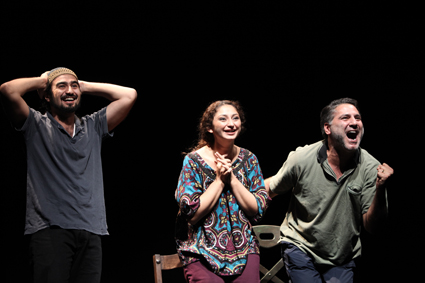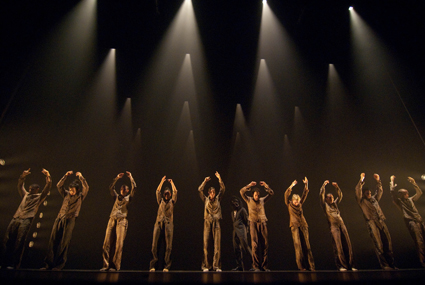love in a cold climate
jana perkovic: 2011 melbourne international arts festival

Hedda Gabler, Schaubühne Berlin
photo Arno Declair
Hedda Gabler, Schaubühne Berlin
IT IS ENTIRELY APPROPRIATE THAT THE BERLIN SCHAUBÜHNE’S PRODUCTION OF HEDDA GABLER WOULD MAINTAIN A TEMPERATURE OF ABOUT 13°C FROM BEGINNING TO END: IBSEN’S ORIGINAL WAS HARDLY A POT-BOILER TO BEGIN WITH. THIS 2005 PRODUCTION WAS TO BE ONE OF THE PREMIERE EVENTS OF THIS YEAR’S MELBOURNE FESTIVAL: THE FIRST WORK BY THOMAS OSTERMEIER TO BE SHOWN IN MELBOURNE (AFTER HAMLET AT THE 2011 SYDNEY FESTIVAL AND NORA (2002) AT ADELAIDE 2008).
hedda gabler
Instead, it disappointed. Two long, interval-less hours of idle chitchat—not even funny!—of three self-absorbed, coarse men, tied together with strings of manipulation pulled by a beautifully superficial young woman.
The acting is delicate and economical, all sideways glances, accurately angled slouches, moments of casual intimacy (a short shoulder massage) as denominators of underappreciated affection. Ostermeier’s Hedda heralded the move away from the whizbang of the 1990s to the simplicity and almost deliberate homeliness of the 2000s (think Benedict Andrews’ The City for STC in 2009, Sasha Waltz’s Medea in 2010). Like all trendsetters, this production exhibits inelegant single-mindedness: it is not much more than two studious hours of bored bourgeoisie, even if the psychological detailing is very fine.
Modernising Hedda has worked well in some ways: divine inspiration, intellectual mediocrity and pettiness are timeless qualities, and it is enormously satisfying to watch Hedda smash (not burn) an old laptop (not manuscript) with a hammer. However, unable to explain Hedda’s idle, self-defeating cruelty as thwarted life energy turned in on itself due to societal constraints (divorce has been legal for some time, as has a woman’s right to work), the production has to have her a spoiled child, too acclimatised to a life of idle nail-filing to realise herself in any de Beauvoirian sense. All characters go down a notch on the maturity scale as a consequence and what we see is less brutally honest than distantly odious.
journeys of love and more love

Journeys of love and more love, motiroti
photo courtesy the company
Journeys of love and more love, motiroti
But if the slow simmering of Hedda Gabler has a dramaturgical and socio-historical point, why does coldness permeate Journeys of love and more love, an autobiographical account of an Indian-English life from the UK’s motiroti, complete with family snaps and real food? We sit around beautifully laid out tables with 11 strangers at each, as Ali Zaidi, an “Indian by birth, Pakistani by migration and British by chance,” presents his slideshow memoir. Zaidi, an immaculately presented man, walks around without sitting down at any table, never quite getting to spend time with his guests—a stadium MC in a small space rather than a welcoming host. His life story includes all the right ingredients: sibling rivalries, romantic dramas, religious humour, lots of food. But it is so heavily mediated—family photos by animation, Zaidi’s voice via microphone, the feelings and emotional truths delivered with slick British-theatrical humour, the food with a heavy input of nouvelle cuisine—that all rude complexity is smoothed out by the time it finally reaches us.
The absence of contact is so thorough it feels like a fundamental dramaturgical decision: Zaidi makes no direct eye contact with the audience, the food is brought out by a catering battalion. For all the talk of intimacy, there was none in this work, and it felt almost offensive to have Zaidi ask at my table questions about our attitudes to love and hate. Such answers must be earned, even in a participatory performance. Journeys…felt like an event organised by a tourism board to promote multiculturalism. Here we were, white people, sitting at restaurant tables, paying money to be fed trendy transmogrifications of ethnic food and being told that this meant sharing. It was an almost perfect, cynical antithesis of hospitality, intimacy and love.
aftermath

Aftermath, New York Theater Workshop
photo Joan Marcus
Aftermath, New York Theater Workshop
It is easier to conceptualise an artful immersion into another’s way of life than it is to execute it. It requires an emotional intelligence to break beyond the self-imposed demand to give the audience a fun, innocuous picnic in difference. Another festival show, Theatre Work’s Site Unseen (cancelled on the night I was to attend), was lambasted in the media for reducing, in the words of John Bailey in the Sunday Age, the “lived reality of destitution to a fun romp through the back streets of St Kilda.” In contrast, the qahwa and chai we are offered by the performers in Aftermath never materialise, but it is still a deeply engaging encounter with another world, that of Iraqi war refugees.
I find it hard to talk about Aftermath for fear of sounding trite: it is superb verbatim theatre, but its strategies are simple and its genius all in the execution. Like any verbatim work, it stages life stories, here of six Iraqi refugees (interviewed by the playwrights in Jordan) through first-person narratives distilled from interviews; it uses actors of broadly Middle-Eastern provenance; staging interventions are minimal; it shapes its loose material to make all the stories escalate in parallel; and it presents an entirely predictable set of accounts of a content everyday life disrupted by war, civil disorder, violence, uncertainty and flight. Like all verbatim theatre, it is half-real, half-creatively reimagined, and the invisible seams between the two make us more receptive to the finely crafted material. But if Aftermath is gutting rather than just a bit sad, it is because it recreates the interview itself, and the interviewees reveal themselves to be not just victims of war, but genuinely warm, kind and generous people.
Between anecdotes come offers of tea and coffee. Family photos, press clippings and club membership cards are offered for inspection. Every so often, a particularly horrific story ends and an Iraqi waves exhaustedly at the narrator: “Translate that.” ‘We’ are not present on this stage, not as interviewers, sympathetic spectators or interlocutors. The imam, who has lost everything in the war—his family, his home, his passport and documents—looks up and says, “I thank these people for their feelings, but there are mistakes for which apologies are not enough.” But even after outbursts of despair or anger, there are apologies, reassurances of welcome: “Please, you must stay for lunch!”
By being so much a show about these people—not just their life tragedies, but the way they have made home in tragedy, and the way they courageously resist acceptance of hatred and violence as normal—it is precisely not a show about us, our voting choices, our identities as left or right-leaning or the details of our domestic political debates. But these two instances of generosity—the generosity of the interviewees with their stories and the generosity of playwrights in recreating them—amounts to an enormous gesture of sharing.
political mother

Political Mother, Hofesh Shechter
photo Simon Aboccedi
Political Mother, Hofesh Shechter
Finally, Hofesh Shechter’s Political Mother illustrates the relationship between the energy of music and the energy of violence. “Where there is pressure, there is folkdance” appears as writing on the wall towards the end, but by that point the thesis has been exceedingly well established by this rambling dance work. Sufi dancing has turned into a marching band, into a political rally, into a rock concert, prisoners’ stumbling, a discotheque and so on in rotation. Delivered to an explosive score (by Shechter himself) at ear-blasting volume, his customarily visceral choreography (half-erect lopes, punches, jitters) draws a continuum between spiritualism, militarism, rebellion, weekend venting and resignation. At its core, Political Mother demonstrates convincingly that one fuels another, that we are made of what we rebel against and that, wherever there is war there are young people in discotheques—for no frivolous reason. But Shechter’s transition into long form is not yet confident: many of the 70 minutes could have been excised to create a work that repeated itself less and delivered a conclusion.
It is true, as Age reviewer Cameron Woodhead suggested in regards to Site Unseen, that “the homeless need food, shelter and respect” more than theatre, bad or otherwise. One could ask if making art is the right response to violence, anomie, forced migration, and if we are buying moral consolation at the price of a theatre ticket. But there are countless atrocities in this world, and there will continue to be, and most of us will never be able to do much about them. The power of works like Aftermath, even Political Mother, is that they deepen what Melbourne historian Maria Tumarkin calls our emotional imagination. They make us understand, in all their detail, worlds of distant, strange people and in doing that, they are training us in empathy. Be it empathy for a Pakistani waiter, an Israeli backpacker or the Iraqi recipient of our tax money, it is empathy that modifies the emotional training we receive from spectacular war journalism, political speeches on ‘wedge issues,’ and the professional opinionati. If that is not a noble achievement, I do not know what is.
Berlin Schaubühne, Hedda Gabler, director Thomas Ostermeier, set design Jan Pappelbaum, music Malte Beckenbach, dramaturgy Marius von Mayenburg, video Sebastien Dupouey, The Arts Centre, Playhouse,Oct 19-23; motiroti (international), Journeys of love and more love, writer, director Ali Zaidi, video, animation Daniel Saul, Katerina Athanasopoulou, composer, sound Andy Pink, food Kim Berkers, Mark Ramsay, The Arts House, Meat Market, Oct 11-16; New York Theater Workshop, Aftermath, text Jessica Blank and Erik Jensen, director Jessica Blank; Malthouse Theatre, Oct 11-14; Political Mother, Hofesh Shechter Company, choreography, music Hofesh Shechter, lighting Lee Curran, costumes Merle Hensel, sound design Tony Birch, The Arts Centre, Playhouse, 12-15 October; 2011 Melbourne International Arts Festival, Oct 10-27
RealTime issue #106 Dec-Jan 2011 pg. 4






